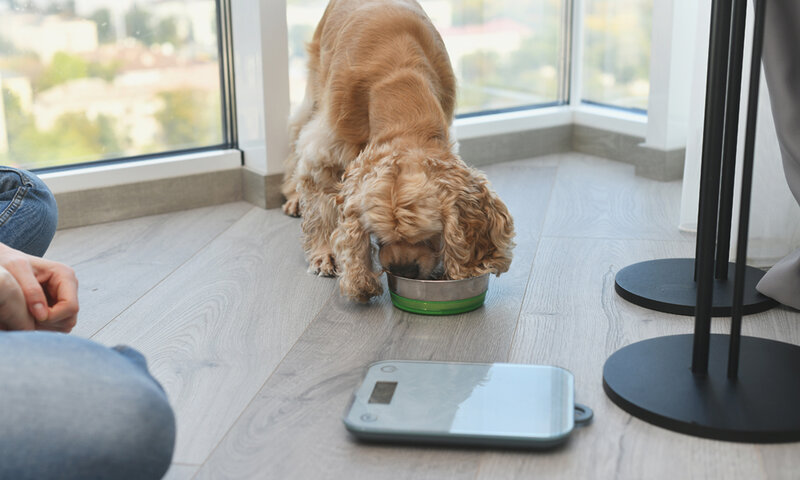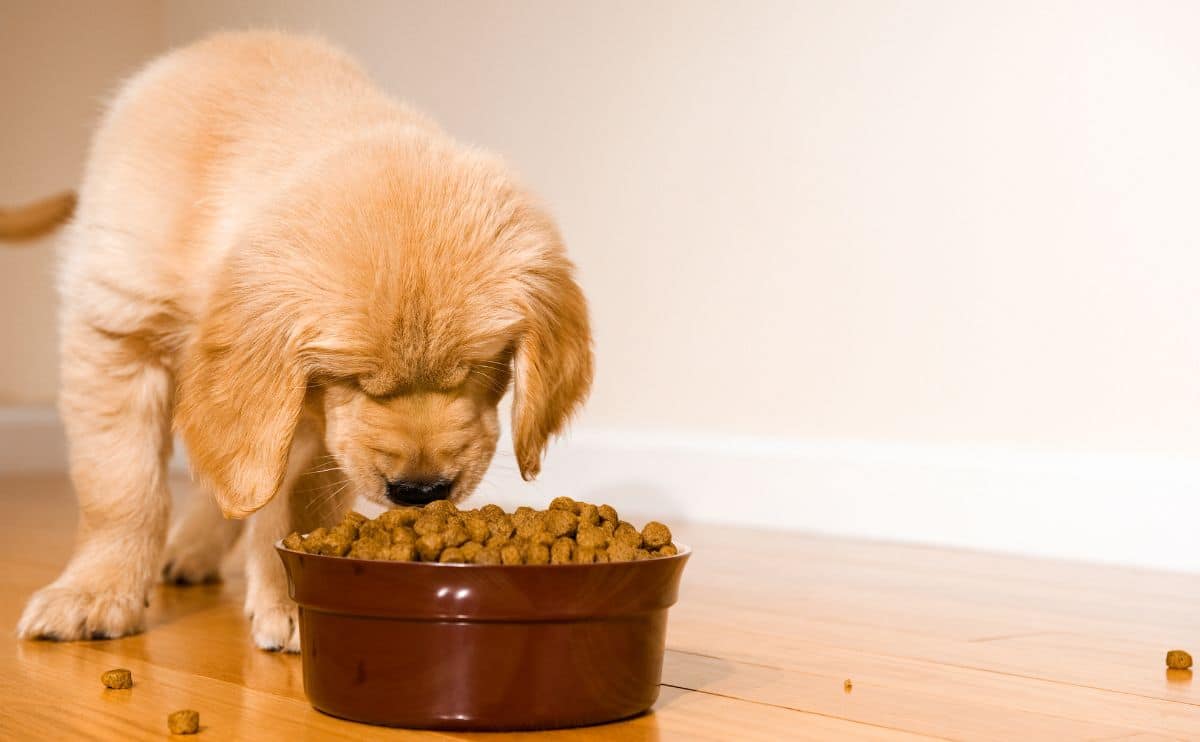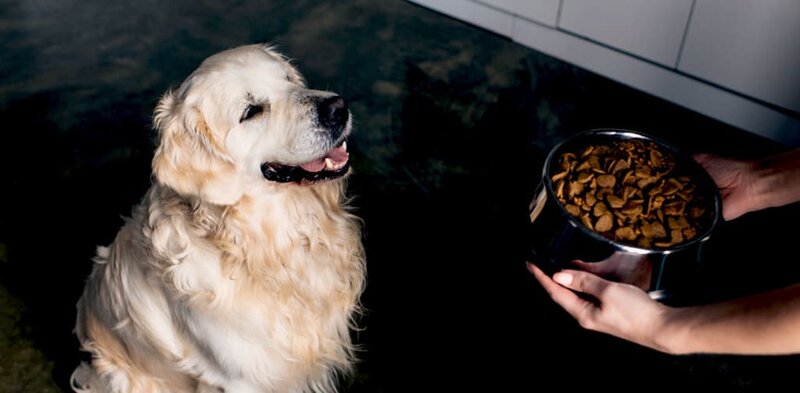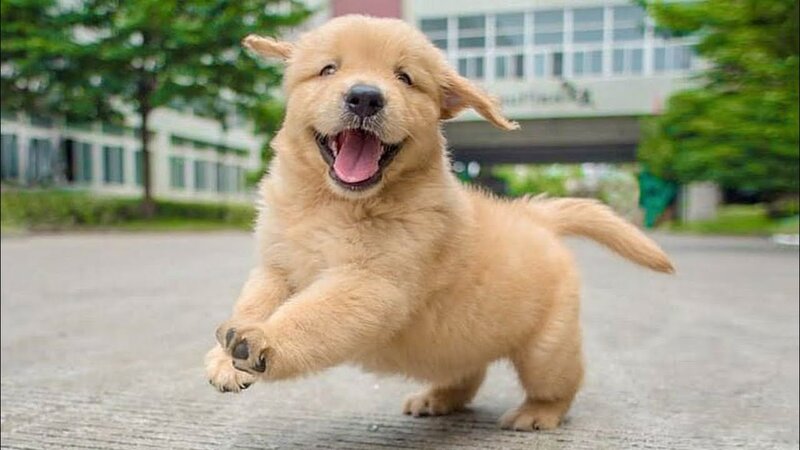How much do golden retrievers eat? What kind of diet should you take into account? It’s vital to remember that this giant dog breed can live for 15 years or more, so owners should consider their nutritional needs at various life periods, such as puppies, older dogs, and nursing mothers. Several factors influence your Golden Retriever’s food amount and dietary demands.
This guide contains instructions and a chart detailing how much to feed a Golden Retriever. There is also information on what to consider when estimating their feeding amount. Scroll down to view growth charts to ensure your dog is feeding at the appropriate rate and within the ideal weight range for his age.
How Much Food Should A Golden Retriever Eat?

So, how much should you feed a Golden Retriever? Your adult Goldie could require up from 1400 to 1500 calories per day.
A few key criteria will impact how much food you feed your dog.
Your male Golden Retriever will require slightly greater amounts of food than a female dog according to weight. The reproductive state of your Golden, i.e., whether it has been spayed or neutered, will also influence calorie requirements.
Some older dogs are less active, so they may require fewer calories. Golden Retrievers, for example, can vary greatly in their daily dietary requirements. If you are unsure how much food your Goldie needs, you should speak with your veterinarian.
No matter what amount you feed your dog, it is best to feed your adult Golden Retriever 2 meals every day, one time in the morning and once more in the evening, which might help build a habit and prevent overfeeding. This regimen can also incorporate exercise and is effective for developing healthy eating habits and potty training.
Below is the golden retriever food amount chart that you can refer to your dog:
| Large Breed Canine Approximate Calorie Requirements Per Day | DRY FOOD | FRESH FOOD | WET FOOD | |
| SPOT & TANGO | NOM NOM | ROYAL CANIN | ||
| Golden Retriever’s Weight (Ibs) | Calories | Daily Feeding Recommendation | ||
| 5 | 387 | 87.4g | 312.8g (2.3 cups) | 357g (0.92 can) |
| 10 | 654 | 147.7g | 528.7g (3.9 cups) | 603.3g (1.6 cans) |
| 15 | 885 | 199.9g | 715.4g (5.3 cups) | 816.4g (2.1 cans) |
| 20 | 1098 | 248g | 887.6g (6.5 cups) | 1012.9g (2.6 cans) |
| 25 | 1299 | 293.5g | 1050g (7.7 cups) | 1198.4g (3.1 cans) |
| 30 | 1488 | 336.2g | 1202.9g (8.8 cups) | 1372.7g (3.6 cans) |
| 35 | 1671 | 377.5g | 1350g (9.9 cups) | 1541.5g (4 cans) |
| 40 | 1845 | 416.8g | 1491.5g (11 cups) | 1702g (4.4 cans) |
| 45 | 2016 | 455.5g | 1629.7g (12 cups) | 1859.7g (4.8 cans) |
| 50 | 2181 | 492.7g | 1763.1g (13 cups) | 2012g (5.2 cans) |
Source: https://www.dogster.com/
When choosing the best dog food for Golden Retrievers, keep in mind that they may be predisposed to certain health concerns. Golden Retrievers are recognized for their lovely coats, but their skin is prone to infection. They enjoy swimming, but doing so in parasite-infested water might be problematic. They are also prone to atopic dermatitis, leading to acute itching in dogs, culminating in licking and biting behaviors that may result in more damage. A fish-based diet may be beneficial for dogs that have skin and coat difficulties since it has a high concentration of fatty acids, which promote skin and coat health.
Remember to always speak with your veterinarian before making any big changes to your dog’s food.
What Affects The Golden Retriever’s Food Amount

Golden Retriever Size
Size refers to weight and height. A grown-up male Golden Retriever weighs 30-35 kg and reaches 56-61 cm. A grownup female Golden Retriever weighs 27-32 kg and measures up to 56 cm on average. As with other dogs, it is critical to keep your pet from becoming overweight. If you have concerns about your pet’s weight, you should consult your veterinarian and limit the number of treats you feed.
See our How Much to Feed Your Golden Retriever Puppy page for further details on how to determine if your puppy is growing properly. This page contains a chart with food portions for each month from eight weeks to adulthood.
Golden Retriever Sensitivities
Golden retrievers may grow to be 12 to 15 years old. You have to be mindful not to overeat, as this might lead to obesity. Golden Retrievers are sensitive to excessive weight gain, which might lead to negative health consequences.
It is critical not to serve cooked bones to your Golden Retriever, just as you would to any other dog. Cooked bones splinter, producing serious problems not only in the mouth and throat but also requiring abdominal surgery. It is only recommended that you feed your dog raw bones and constantly supervise.
Golden Retriever Activity Levels
Golden Retrievers are flexible and adaptable, making them ideal as both a family companion and a working dog. They make excellent companion pets and have been shown to thrive in the company of other four-legged creatures such as rabbits. In the international arena, Golden Retrievers are dedicated rescue dogs, retrieving pets, and guiding dogs.
Read more >> Are Golden Retrievers Good With Kids?
Working Golden Retrievers are more active, thus they will need a carbohydrate-rich diet as their primary source of energy. It is also critical to ensure that the fat content is moderate. Adjusting this based on your dog’s activity level. If in doubt, contact your local veterinarian.
Golden Retrievers who are less active should eat fewer calories.
How Often Should I Feed My Golden Retriever?

Keeping a regular feeding schedule for your Golden Retriever is the best method to keep up with the amount and timing. When your Goldie matures from a puppy to an adult dog, the number of meals required per day decreases as their digestive systems expand. Your dog will require two meals every day, one in the evening and one in the morning, beginning at the age of six months.
| Age | Feeding Frequency |
| Under 8 weeks | 3 – 4 times a day |
| 8 weeks – 11 months | 3 times a day |
| Over 11 months | 2 times a day |
A constant feeding schedule allows you to monitor your dog’s food-related behaviors. Golden retrievers like eating, but their voracious appetite can lead to less social eating practices such as guarding and hostility. A feeding plan allows you and your dog to concentrate on preventing these reactions through training. You may also plan your exercise and toileting routine around meal times.
You may easily plan your dog’s food schedule around your own. If you feed your pet before a morning or evening walk, ensure that they have enough time to digest. You should also ensure that kids have adequate time after their dinner to burn off all of their energy before going to bed.
How Many Treats Should I Give My Golden Retriever?

One of the finest aspects of your Golden Retriever’s food-loving personality is how simple it is to train! A food-motivated dog will react favorably to treat-based, reinforcement-based training. Golden retrievers are widely utilized as seeing-eye and therapy dogs due to their high intelligence and eagerness to please their owners. You may harness this natural tendency to teach your dog not only tricks, but also how to be an accountable, friendly, and well-mannered pet.
Of course, treating your dog can go out of control. While owners enjoy demonstrating their devotion with treats, and Golden Retrievers clearly enjoy eating them, snacks should only account for 10% of your dog’s daily caloric consumption. Ensure that the treats you feed your dog are not simply tasty but also nutritionally appropriate, such as veggie chunks, chicken, or meat.
Summary
Knowing your Golden Retriever’s nutritional requirements is critical for their overall health. A carefully prepared Golden Retriever food amount is also suggested. Many popular brands offered by your vet or pet store can exactly meet your breed’s diet requirements. Always adhere to the manufacturer’s feeding guidelines and seek assistance if you have any concerns about the dog’s weight or health. It’s crucial to remember that certain Golden Retrievers have a voracious appetite, and meeting their dietary requirements will prevent numerous health problems.

As a dedicated pet writer with a passion for Golden Retrievers, I’ve spent years studying and writing information to help owners give the finest care for their beautiful companions. While I do not personally own a Golden Retriever, my writing stems from a genuine love for the breed and a desire to provide useful, well-researched information. My goal is to provide practical and useful advice to Golden Retriever owners on topics such as food selection, common health conditions, and training strategies.

